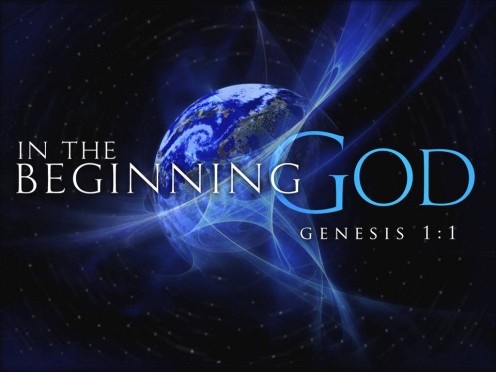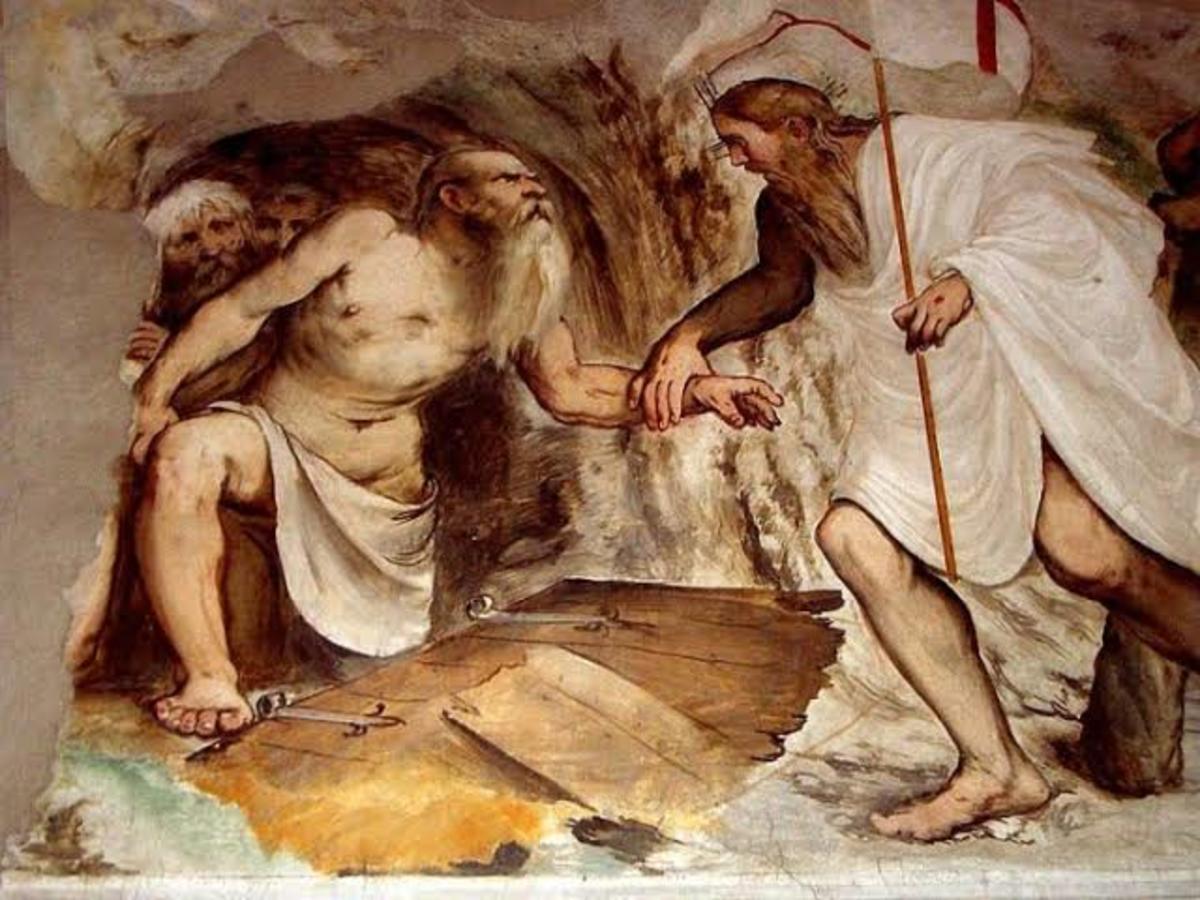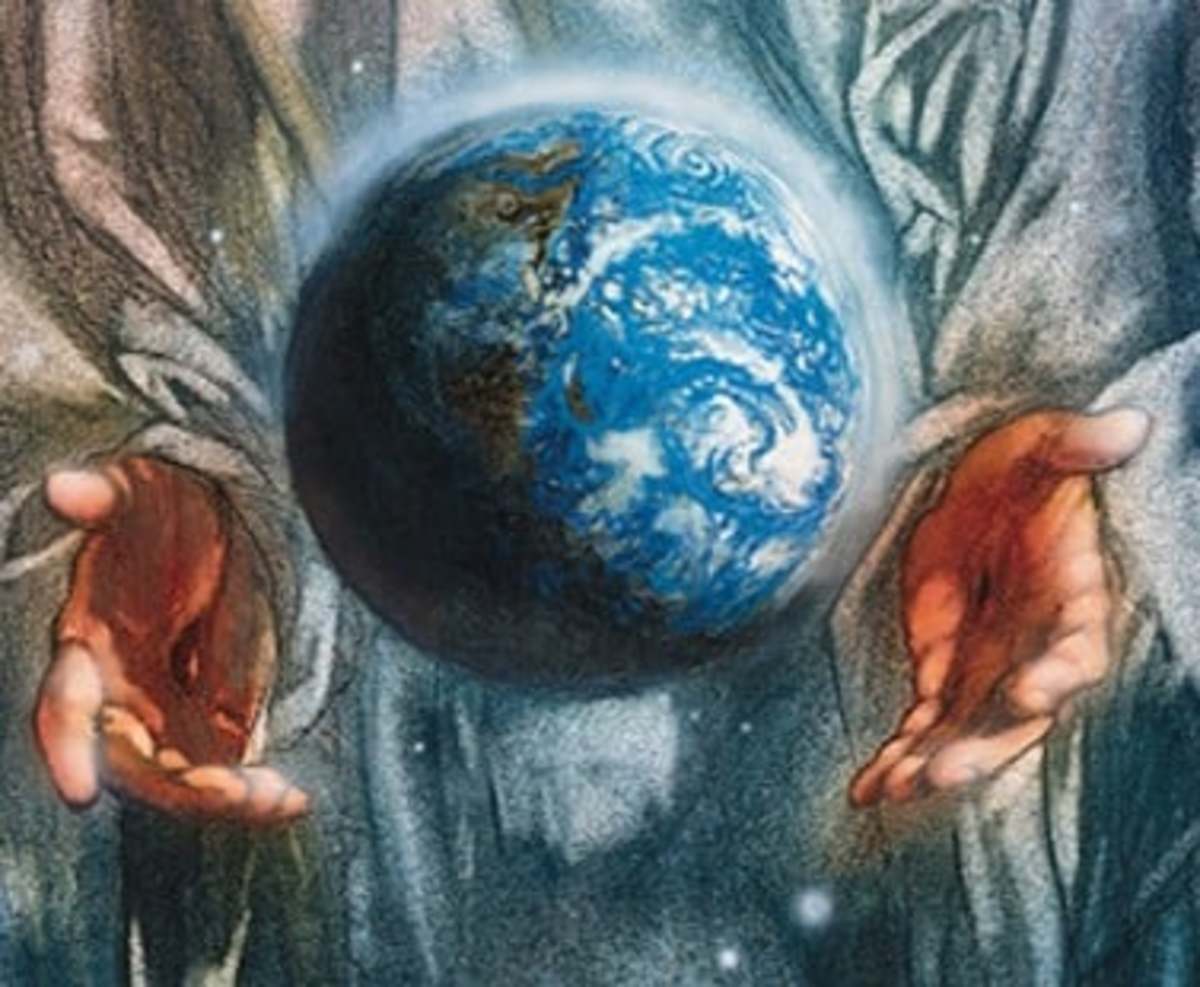GOD - In the Beginning

All Bible verses quoted are from the Authorized King James Version of the Bible. All Greek, Hebrew, Aramaic and Latin words are both underlined and in italics. Definitions for the figures of speech pointed out in this hub are from the 1898 edition of "Figures of Speech Used in the Bible" by E.W. Bullinger.
“In the beginning God created the heaven and the earth.”
Genesis 1:1 properly reads in the Hebrew, “God created the heavens and the earth in the beginning.” Placing "God" first in the verse and in the Bible puts Him in His proper position.
The words "in the beginning," breashith in Hebrew, mean "origin" in English or genesis in Greek. The word "God," Elohim, is plural to emphasize God’s creative greatness. "Heavens" is the Hebrew word shamayim, also in the plural form, to point out the vastness of this expanse. The heavens are so extensive that even though man has touched the moon and explores the outer realms of our Galaxy, he has not begun to explore the heavens which God created in the beginning.
Verse 1 sets like a diamond. The KJV translation team that divided the Bible into chapters probably should have considered making verse 1 a chapter in itself and began chapter 2 with what now is verse 2 of chapter 1. The reason for this consideration is that trillions of years may have elapsed between verse 1 and verse 2. Now I don't know how long this period of time was, but God says "In the beginning," and that's good enough for me. Actually, no one knows the length of time between the events recorded in verses 1 and 2; but it is known that when the account given by verse 2 begins, something catastrophic had happened in the heavens and on the earth. In the beginning when God created the heavens and the earth, all the creation was in perfect condition. But an astounding change occurred by the time of the record of Genesis 1:2. About this cataclysmic occurrence, 2 Peter 3 gives more information:
2 Peter 3:5-7:
- "For this they willingly are ignorant of, that by the word of God the heavens were of old, and the earth standing out of the water and in the water:
- Whereby the world that then was, being overflowed with water, perished-
- But the heavens and the earth, which are now, by the same word are kept in store, reserved unto fire against the day of judgment and perdition of ungodly men."
2 Peter states that there were first the original heavens and earth of Genesis 1:1, and then came the heavens and earth which are now. This present heavens and earth are the ones which will last until the judgment. But, after the judgment, 2 Peter records that there will be the third heaven and earth:
2 Peter 3:13:
- "look for new heavens and a new earth, wherein dwelleth righteousness."
A further corroboration of 2 Peter 3:13 is given in the book of Revelation:
Revelation 21:1:
- "And I saw a new heaven and a new earth: for the first [former] heaven and the first [former] earth were passed away; and there was no more sea."
Thus the Bible designates three periods of time in referring to heaven and earth. The first one is Genesis 1:1, the second one follows Genesis 1:2 until the time of the “last judgment,” which occasion ushers in the third heaven and earth. The heavens and earth which are now, the second heavens and earth, begin with Genesis 1:3, and their formation is completed when Genesis 2:1 says, “Thus the heavens and the earth were finished..."
The last three words of Genesis 1:1 are “and the earth." Immediately following, verse 2 begins with the same phrase, “And the earth...” This is a figure of speech called anadiplosis, meaning that the next thought begins with the same words ending the previous thought, a repetition. Within this figure of speech is another figure: the repeated usage of the word “and.” In the ancient texts, the first word in the Bible would be “God.” But the rest of the verses in chapter 1 begin with the word “and.” This figure of speech is called polysyndeton. There are 102 separate acts of God listed in the 34 verses following Genesis1:1, and all the acts begin with “and.” The purpose of this figure of speech is to emphasize God throughout: “God created, and God..., and God..., and God...” God has always been the reason for our existence. He is the Creator - we are not. As Romans 9:21 puts it - we are as the clay to the potter. These "ands" in Genesis 1 are used with divine design, not haphazardly.
When God created the heavens and the earth in the beginning, He did not create them in the chaos found in verse 2:
Genesis 1:2:
- "And the earth was without form, and void; and darkness was upon the face of the deep. And the Spirit of God moved upon the face of the waters."
First of all, in examining verse 2 a student of the Bible must be aware that in the original Estrangelo Aramaic and Hebrew there was no verb “to be,” although there was the verb “to become.” This is the reason the first "was" in verse 2 is in regular print while the second “was” is italicized. It points out that there was no Hebrew word in the second usage; there was no word at that place at all, but there was a word for the first usage. The first word "was" should have been translated "became", as it is in other English translations. "And the earth became without form and void..."
The earth was not created in Genesis 1:1 formless and void, but it became that way.The words "form, and void" are a figure of speech, paronomasia, meaning "similar in sound but not in sense or meaning." One does not understand this by reading the English words "form, and void," for they do not have similar sounds. But the Hebrew words, tohu and bohu, are similar in sound but not in meaning. Isaiah 45 and Jeremiah 4 point out that the heavens and earth were not created tohu va bohu:
Isaiah 45:18:
- "For thus saith the Lord that created the heavens; God himself that formed the earth and made it; meaning he hath established it, he created it not in vain [tohu]..."
Jeremiah 4:23:
- "I beheld the earth, and, lo, it was without form, and void [tohu va bohu]..."
God did not create the heavens and the earth tohu va bohu, the condition in which it was found in Genesis 1:2. The whole creation was originally perfect. Isaiah tells more about how the earth became without form and void. Isaiah records that in the beginning, sometime before Genesis 1:2, God created angels, spirit beings. When He created these angels, He put all the angels under three heads: Gabriel, Michael and Lucifer. But celestial strife ensued, with Lucifer and a third of the angels trying to usurp the throne of God. Consequently these spirit beings were dispelled from heaven and became known as the fallen angels, the enemies of God.
Ezekiel 28 speaks of Lucifer who was at one time the angel of light:
Ezekiel 28:15:
- "Thou [Lucifer] wast perfect in thy ways from the day that thou wast created, till iniquity was found in thee."
There is not enough information from God in the Bible to substantiate the exact chain of events that occurred prior to Genesis 1:2, but whatever happened between Genesis 1:1 and 1:2 was of such a cataclysmic nature that a perfectly created earth became tohu va bohu. If one were to venture a guess, it would seem most likely that when Lucifer rebelled in heaven, the whole creation rocked and reeled. Romans 8 says that even until today, under the power of satanic influences and the effects of sin, that the “whole creation groaneth and travaileth in pain..."
But whatever happened, Genesis 1:2 begins the record of God’s putting His creation in order after the first heaven and earth:
Genesis 1:2:
- "And the earth was [became] without form, and void; and darkness was upon the face of the deep. And the Spirit of God moved upon the face of the waters."
“And the Spirit of God moved upon the face of the waters.” The word “moved” is also the word “brooded.” The Spirit of God is pictured as a hen brooding, sitting on eggs. This is a figure of speech, anthropopatheia in Greek or condescensio in Latin, where God is given attributes of animal life. What is God going to hatch? He is going to bring into existence the earth as we know it today.
Figuratively, God was sitting on a situation which was ready to crack out like the chick bursts out of the egg shell. What does God bring about after His brooding? The third verse begins giving the record:
Genesis 1:3:
- "And God said, Let there be light: and there was light."
The next question people frequently have when they read verse 3 is: “What specifically happened when Genesis records ‘And God said’?” “And God said” is all the Scriptures tells us. A person cannot know more than the Bible tells us. There undoubtedly are numerous things we would like to know, but remember the knowledge given to us in Deuteronomy 29:29: “The secret things belong unto the Lord our God: but those things which are revealed belong unto us and to our children for ever, that we may do all the words of this law.” Verse 5 of Genesis says, “And God called...” Verse 6 records, “And God said...” Verse 9 reports, “And God said...” All we know is that when God spoke, what He spoke came to pass.
Verse 3 of Genesis 1 and the rest of chapter 1 into chapter 2 relate the events of God’s putting this earth back in order so that it was habitable for one of the greatest things God was going to do: the forming, the making and the creating of man.
Verses 4 and 5 explain what happened after God spoke light into existence:
Genesis 1:4, 5:
- "And God saw the light, that it was good: and God divided the light from the darkness.
- And God called the light Day, and the darkness he called Night. And the evening and the morning were the first day."
The “evening and the morning” is a figure of speech called synecdoche, meaning that the beginning and the ending stand for the entire period. Evening and morning are meant to represent the entire day, a period of twenty-four hours.
Genesis 1:6-8:
- "And God said, Let there be a firmament in the midst of the waters, and let it divide the waters from the waters.
- And God made the firmament, and divided the waters which were under the firmament from the waters which were above the firmament: and it was so.
- And God called the firmament Heaven. And the evening and the morning were the second day."
The word “firmament” throughout this passage is “expanse.” “And God called the expanse heaven,” meaning “lofty” or “high.” Biblically speaking, any place above the earth is heaven. Whenever anything is not in contact with the earth, it is in heaven.
Genesis 1:9,10:
- "And God said, Let the waters under the heaven be gathered together unto one place, and let the dry land appear: and it was so.
- And God called the dry land Earth; and the gathering together of the waters called he Seas: and God saw that it was good."
In the first nine verses of Genesis 1, the word “earth” refers to the planet; beginning with verse 9, “earth” refers to dry land.
Genesis 1:11:
- "And God said, Let the earth [dry land] bring forth grass, the herb yielding seed, and the fruit tree yielding fruit after his kind, whose seed is in itself, upon the earth: and it was so."
Verse 11 divulges many interesting truths. First, note that it says all are to bring forth after their kind. “Kind” is the word genos in the Septuagint, transliterated into English as “genus.” This means that when a cow is bred to a bull, a calf will be the result, not a lamb. A dog and a cow cannot breed and get a cow-dog, nor will a cat and a dog produce a catty-dog or a doggy-cat. Why? Because everything comes after its kind, after its genus. There can be evolution or change within a genus but not between genera.
Variety occurs within a genus. For example, there are big cows and small cows, black, red and white cows; there are Guernseys, Jerseys and Brown Swiss. Much variety has occurred within the bovine genus, but this genus has not crossed with another genus, or Genesis 1:11 would not be true.
Genesis 1:11:
- "And God said, Let the earth bring forth grass, the herb yielding seed, and the fruit tree yielding fruit after his kind, whose seed is in itself, upon the earth: and it was so."
"His" in "after his kind" is "its." There is no neuter form in Estrangelo Aramaic nor in Hebrew, and this is why it is in the masculine, but it should be translated "its", for "the fruit tree" is indeed and "it", not a male or female.
This "after its kind" may seem like an insignificant point, but a good example of not accurately following the teachings of the Bible regarding everything “after its kind” is found in a common false interpretation of Genesis 6 (as well as in the false science of Darwinism). So let us take a brief detour and consider for a moment what Genesis 6 really is teaching, this will help us as we proceed here in Chapter 1.
Genesis 6:1-4:
- "And it came to pass, when men began to multiply the face of the earth, and daughters were born unto them.
- That the sons of God saw the daughters of men that they were fair; and they took them wives of all which they chose.
- There were giants in the earth in those days; and also after that, when the sons of God came in unto the daughters of men, and they bare children to them,
- the same became mighty men which were of old, men of renown."
Some teach that wicked angels cohabited with human beings. These teachers propound that the offspring of these angels and human beings were the giants, nephilim * (see note below this paragraph), which infiltrated mankind and which were responsible for bringing about the destruction of all mankind with the exception of Noah, his wife, three sons and their wives. This teaching is not Biblically accurate. If angels, who are spirit beings, can copulate with a human, then genera have interbred. Moreover, angels, spirits, cannot procreate. Sexual Intercourse between man and angels cannot be possible, for one, angels are spirits, for another the Bible says that everything produces after its kind. In context Genesis 6:4 refers to the faithful of God as “the sons of God” and those unbelieving persons as “daughters of men,” regardless of whether male or female. When believers wandered from their own and married unbelievers, trouble ensued, Of course, the offspring of these marriages were products of parents of the same genus. No problem exists in Genesis 6 if readers don’t make one.
* These were giants or champions of wickedness. The root of the Hebrew word nephilim means “to fall.” They were “fallen ones.” The Estrangelo Aramaic gives this word as the intensive form of gbra, meaning “very mighty men or champions.” The word “giants,” gigantes, was used in the Septuagint, the Syriac Version and the Vulgate.
Everything must be after its kind “whose seed is in itself.” Seed, the potential for offspring, is “in itself.” All life is passed on through seed, whether the life be plant or animal. In animal life seed comes from the male. When the sperm of the male, which contains the seed for the new life, impregnates the female egg, a new life begins. In animals the soul-life is in the blood, as Leviticus 17:11 records, “The life of the flesh is in the blood.”
Since all men come from the same blood, the question arises as to how the blood was carried along after the first generation on earth — Adam and Eve’s children. In other words, whom did the children of Adam and Eve marry? The only persons available for the Sons and daughters of Adam and Eve were each other. Cain married his sister, as did Abel, Seth and the other children. In our day the bloodlines have become so contaminated that intra-family marriage is forbidden by law as too many undesirable characteristics come out with close in-breeding of humans. But Adam’s children could only marry each other. The sons of Adam married their own sisters. If we had pure bloodstreams, we could marry our sisters. The reason we are not allowed now to marry sisters is that the impurities in our blood would cause complications in the following generations.
Because of purer blood, people lived longer as the early Biblical records tell. Some people try to explain early man’s longevity by saying that their years weren’t as long as ours; but that simply isn’t true. Time then was the same as now. The reason for such longevity was that their blood had not become so contaminated, so impure. Marriage and sin eventually began to produce weaker people who, therefore, died at an earlier age. Modern medicine seems to have reveresed this process to some degree, but never will it get back to the longgevity that there once was.
The words "seed in itself" are the figure of speech polyptoton, meaning the same part of speech but with a different inflection. To literalize verse 11, it would read “...after its kind seeding seed upon the earth: and it was so.”
Genesis 1:12-26:
- "And the earth brought forth grass, and herb yielding seed after his kind, and the tree yielding fruit, whose seed was in itself, after his kind: and God saw that it was good.
- And the evening and the morning were the third day.
- And God said, Let there be lights in the firmament of the heaven to divide the day from the night; and let them be for signs, and for seasons, and for days, and years:
- And let them be for lights in the firmament of the heaven to give light upon the earth: and it was so.
- And God made two great lights; the greater light to rule the day, and the lesser light to rule the night: he made the stars also.
- And God set them in the firmament of the heaven to give light upon the earth.
- And to rule over the day and over the night, and to divide the light from the darkness: and God saw that it was good.
- And the evening and the morning were the fourth day.
- And God said, Let the waters bring forth abundantly the moving creature that hath life, and fowl that may fly above the earth in the open firmament of heaven.
- And God created great whales, and every living creature that moveth, which the waters brought forth abundantly, after their kind, and every winged fowl after his kind: and God saw that it was good.
- And God blessed them, saying, Be fruitful, and multiply, and fill the waters in the seas, and let fowl multiply in the earth.
- And the evening and the morning were the fifth day.
- And God said, Let the earth bring forth the living creature after his kind, cattle, and creeping thing, and beast of the earth after his kind: and it was so.
- And God made the beast of the earth after his kind, and cattle after their kind, and every thing that creepeth upon the earth after his kind: and God saw that it was good.
- And God said, Let us make man in our image, after our likeness: and let them have dominion over the fish of the sea, and over the fowl of the air, and over the cattle, and over all the earth, and over every creeping thing that creepeth upon the earth."
Several modern theologians have conjectured that the words “Let us” in verse 26 prove that God is discussing the situation with Jesus — that is why the text reads “us,” instead of, “Let me make man...” If God were talking to Jesus, the problems of Biblical accuracy elsewhere are going to become overwhelming. This usage of “us” in verse 26 is similar to the English expression used by a monarch when the monarch refers to himself as ruler and source of authority. When speaking in her official capacity, the Queen of England to this very day uses the expression, “We, the Queen of England.” When God said, “Let us make man in our image, after our likeness,” He used "us" for He was speaking of Himself as supreme ruler.
“Our image after our likeness" is the figure of speech hendiadys, meaning “two for one” – two words used for one thing meant. God was going to make man in His own (1) image and (2) likeness. The Bible proclaims that God is holy, God is love, God is light, God is just, etc., but in the context of this passage, the primary point being made is that God’s image and likeness is Spirit (see John 4:24).
Genesis 1:27:
- "So God created man in his own image, in the image of God created he him; male and female created he them"
Genesis 1:27 tells us that God "Created man in His image... both male and female created He them" (God is Spirit, which we know from John 4:24). Thessalonians 5:23 is one record that shows that believers are three part beings, "spirit, soul and body." Isaiah 43:7 is one record that shows that man was originally "created, made and formed." We also see from Genesis 2:7 that God formed Adam's body from the dust of the ground and that He made Adam a living soul when He breathed the breath of life into his nostrils. Now when you put this all together Genesis makes a lot more sense, in that it tells us that God formed the bodies of Adam and Eve, that He made them both to be living souls, and that He created them in His image (spirit). Adam and Eve were formed, made and created - body, soul and spirit respectively. This is the same today for us - our physical life started at some point during the process of our bodies being formed in our mother's wombs, and then we were made to be "living souls" when we took our first breath at birth, and then later we became "a new creation" when we confessed with our mouths the Lord Jesus and believed God raised him from the dead (see Romans 10:9, 10 and 2Corinthians 5:17).
God told Adam and Eve in Genesis 2:17, "in [on] the day [that very day] that thou eatest thereof thou shalt surely die". God did not lie. They died spiritually on that day and they lost their direct connection to God - they lost the spirit God had created in them. This was indeed a tragic loss for all mankind, as history clearly shows; however, Jesus Christ has acquired a better spiritual life for mankind (which is received by those who accept this tremendous gift of grace). This new life in Christ is eternal life, and it is also a matter of forevermore being reconnected to God (reconciled - see Romans 5:10 and 2 Corinthians 5:18) . God calls this new eternal life a gift, not a wage, it cannot be earned. And God calls this free gift of His grace "eternal life" because that is exactly what He means. If we could lose it He would have called it "conditional life" not "eternal life." In this respect, what we have is very different from what Adam and Eve had - we can't blow it - we can't lose our connection to God - we have the blood of Jesus Christ cleansing us from all sin (see 1 John 1:7 and Hebrews 10:10-12). His death on the cross was once and for all, for all. Now back to Adam and Eve:
Genesis 1:28:
- "And God blessed them, and God said unto them, Be fruitful, and multiply, and replenish the earth, and subdue it: and have dominion over the fish of the sea, and over the fowl of the air, and over every living thing that moveth upon the earth."
God told Adam and Eve to be fruitful and multiply. He further added, “...and replenish the earth." The word “replenish” brings out a very interesting point. How can one replenish the earth if life had never been there before? That is why God must have had something else going on in Genesis 1:1 besides, and in addition to, the angels which He created. There must have been beings upon the earth before the establishment of the earth as it is known today which is recorded in verse 2, because God said to Adam and Eve, “You replenish the earth.” If they were going to replenish it, the earth must have been “plenished” before.
True Bible never contradicts with true science. God could and did have some type of life prior to Genesis 1:2. However, whatever these prehistoric beings were, they could not have been the same forms of life as we know today. If they were the same, God would not have had to form, make or create them again. But as science also proclaims, the earth had been populated prior to Genesis 1:2, that is why God could rightly say to Adam and Eve, “Replenish the earth and subdue it." "To subdue" means “to tame it and take it over,” for there was no one above Adam and Eve except God. Adam was God’s steward; he ran the whole show. In the beginning God gave man rulership, dominion, authority and power over all His creation. But Adam disobeyed God in the garden of Eden and lost it; and ever since, even things which can barely be seen under a microscope are killing people constantly (but never fret, you who belong to Christ, the same dominion Adam and Eve had (and then some) has been restored to us who believe, praise God).
Genesis 1:29-2:2:
- "And God said, Behold, I have given you every herb bearing seed, which is upon the face of all the earth, and every tree, in the which is the fruit of a tree yielding seed; to you it shall be for meat.
- And to every beast of the earth, and to every fowl of the air, and to every thing that creepeth
upon the earth, wherein there is life, I have given every green herb for meat: and it was so. - And God saw every thing that he had made, and, behold, it was very good [not just good, but very good]. And the evening and the morning were the sixth day.
- Thus the heavens and the earth were finished, and all the host of them [This is the second heavens and earth as recorded in 2 Peter 3:7].
- And on [by] the seventh day God ended his work which he had made; and he rested on the seventh day from all his work which he had made. God ended His work on the sixth day and He rested on the seventh."
God didn’t rest because of fatigue; He rested from His activity. It was finished. When the Bible records that Jesus Christ ascended into heaven and sat down, the same word, “rested,” is used. His job was finished. Again on Pentecost, as recorded in Acts 2, the spirit sat [rested] on each of the believers; the same word, “rested,” is used. When the gift of holy spirit came into believers on and following the day of Pentecost, all the power and authority was reestablished in believers. What man had lost in power, authority, rulership and dominion since Genesis 1:28, he regains at the time of the new birth.
Genesis 2:3:
- And God blessed the seventh day, and sanctified it: because that in it he had rested from all his work which God created and made.
The next twenty-three verses, from Genesis 2:4 to 25, simply give the details and amplifications of chapter 1. Genesis 2:9-14 could chronologically be inserted between verses 12 and 13 of chapter 1.
To understand how God organized this second heaven and earth and the rules which were originally established, we must have a minute and detailed knowledge of the first few chapters of Genesis. We must understand the origins of life and its laws if we are to perceive the greatness of God’s Word and the justness of His ways. In Genesis lies the foundation of the accuracy of His matchless Word.








